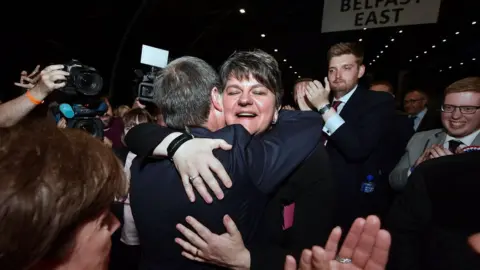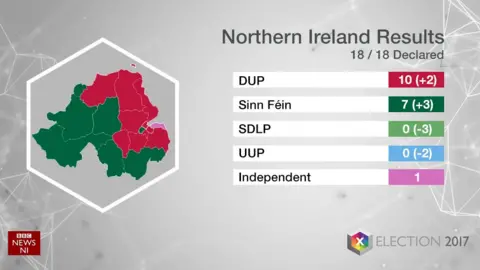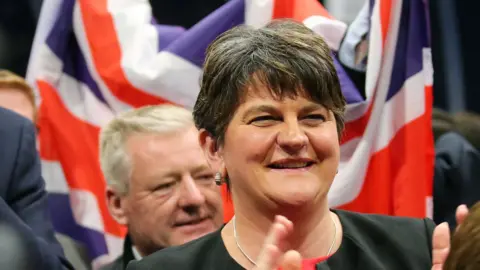Election results 2017: Could the Democratic Unionist Party be Westminster kingmakers?
 Getty Images
Getty ImagesIn 2015, the Democratic Unionist Party (DUP) built its general election campaign around the idea that its MPs might be kingmakers at Westminster.
Their posters bore the slogan "More Votes. More Seats. More Influence. More for Northern Ireland".
When David Cameron won his majority, that strategy was quietly forgotten.
But that's the position the 10 newly returned DUP MPs are in, despite leader Arlene Foster predicting it did "not look likely" at the campaign outset.
An arrangement with a Labour-led Rainbow Coalition is a non-starter. Senior DUP figures have made clear their antipathy towards Jeremy Corbyn because of his historic links with Sinn Féin.
Theresa May - or whoever succeeds her - would be a far more plausible partner for the DUP, which is pro-Brexit and right of centre on many issues.
DUP sources say it is too early to predict whether they might consider a formal coalition or a more informal "confidence and supply" arrangement. But what would they want in return for such support?

Who are the DUP?
The Democratic Unionist Party is the largest political party in Northern Ireland.
It was the most Euro-sceptic party in the UK before the ascent of UKIP.
It opposes same-sex marriage, and is anti-abortion.
DUP MPs have been consistently critical of Jeremy Corbyn, particularly for his past links with Sinn Féin and his stance on security.
But they have made positive comments about Theresa May's leadership of the Conservative Party.
The DUP based its Westminster campaign around a call to defend the union, saying unionists had to turn out to rebut republican demands for a referendum on Irish unity.
Read more here.

On Brexit, the DUP want the border with the Irish Republic to be as "seamless and frictionless" as possible, and they reject the Special EU status championed by Sinn Féin, which they regard as watering down Northern Ireland's Britishness.
Other clues to what the DUP might demand can be gleaned from their manifesto, which includes retaining the "triple lock" on pensions, cutting VAT for tourism businesses, abolishing Air Passenger Duty, and reviewing the price of ferries between Northern Ireland and Great Britain.

The DUP's 10 MPs - a gain of two since the last election - are the fruit of a polarisation in politics in Northern Ireland.
The party had a difficult Northern Ireland Assembly election in March, when Sinn Féin made substantial gains.
This election was to some extent a return match and the DUP was able to rally its supporters in order to ensure Sinn Féin did not become the biggest party in Northern Ireland.
Sinn Féin has done well, winning a record seven seats. The casualties were the two smaller, more moderate nationalist and unionist parties - the SDLP and the Ulster Unionists - who have been wiped off the map.
The Sinn Féin president Gerry Adams has reiterated that his new MPs will not abandon their abstentionism - the party's MPs do not take their seats in Westminster.
 Press Eye
Press EyeThat means there will be no Irish nationalist voice in the House of Commons chamber as the forthcoming Brexit negotiations unfold.
The fact that the seven Sinn Féin MPs won't take their seats will also have an impact on the arithmetic of the hung parliament, reducing the winning post from 326 to something more like 322 seats.
So ironically Sinn Féin might, by staying away, make the management of the new parliament a little easier for the DUP and the Conservatives.
At Stormont, the seat of the Northern Ireland Assembly, there is no power-sharing executive because of a stand off between the DUP and Sinn Féin, which has remained unresolved since the start of this year.
Talks were due to get going after this election, with the aim of restoring power sharing within the next three weeks.
But now it looks like the DUP will be double-booked, playing a role in forming a government not at Stormont, but at Westminster.
